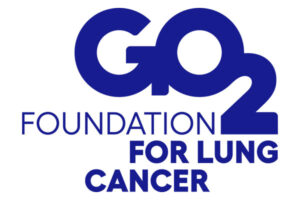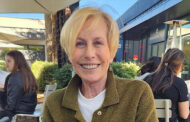 Just as the advances in lung cancer therapeutics and testing have led to people with lung cancer leading longer, better-quality lives, the advances in lung cancer patient advocacy, such as those made by GO2 Foundation for Lung Cancer, are leading to more robust and tailored resources for patients with lung cancer. Through GO2 Foundation, people with lung cancer can find a wealth of scientific data, as well as support for emotional and care-based needs through participation in virtual forums and groups. Individuals with lung cancer can find information, provide insights, learn coping skills, and more—all on one website.
Just as the advances in lung cancer therapeutics and testing have led to people with lung cancer leading longer, better-quality lives, the advances in lung cancer patient advocacy, such as those made by GO2 Foundation for Lung Cancer, are leading to more robust and tailored resources for patients with lung cancer. Through GO2 Foundation, people with lung cancer can find a wealth of scientific data, as well as support for emotional and care-based needs through participation in virtual forums and groups. Individuals with lung cancer can find information, provide insights, learn coping skills, and more—all on one website.
But what about the friends and family members, the caregivers and co-survivors of people living with lung cancer, who assist people with lung cancer with their emotional and physical struggles throughout the care continuum? Despite the fact that nearly 50% of caregivers of people with lung cancer experience depression and anxiety,1,2 there are few programs that offer a collection of resources designed specifically for caregivers.
GO2 Foundation, through the Lung Cancer Registry, aims to address this by disseminating a worldwide survey focused on the experiences of those caring for individuals with lung cancer. The survey data will directly guide development of caregiver support programs and caregiver resources.
“Caregivers are an incredible backbone for our society, and they do not get the support they merit right now, but we want to change that,” said J. Nicholas Dionne-Odom, PhD, RN, co-director of caregiver and bereavement support services at the University of Alabama at Birmingham Center for Palliative and Supportive Care. “Because there’s no public health surveillance mechanism for the family caregiving population, the GO2 Foundation is laying the groundwork for improving our understanding of what circumstances caregivers are facing, how anxious and distressed they are, and what types of support will best meet their needs.”
Dr. Dionne-Odom was on the panel of global caregivers, researchers, and patient advocates who created the survey, and he has done considerable work on developing interventions for caregivers of people with advanced cancer.3 During his time as an ICU nurse and performing palliative counseling for families, he has heard directly from caregivers and co-survivors who have conveyed the high stress of their circumstances and their unpreparedness for these challenges.
“The best way that we can begin to truly help caregivers is to listen to them. We need to hear how they’re doing and what they need,” Dr. Dionne-Odom said. “If we can provide them a platform to voice their experiences and struggles, we can develop better services for them where they are trained, supported, and valued.”
Casting a Global Net
The survey is composed of approximately 20 questions—available in English, Spanish, German, French and simplified Chinese—that focus on the caregivers’ mental health and well-being, cultural differences, coping mechanisms, financial contributions to their loved one’s care, and the different ways that caregivers find and define value during their caring for a person living with lung cancer. Participants are asked to complete the survey twice over 6 months to capture changes in experiences.
To ensure the widespread reach of the survey, the International Association for the Study of Lung Cancer (IASLC) has partnered with GO2 Foundation on the caregiver survey. By promoting the caregiver survey to its membership and other advocacy partners, as well as to its industry contacts through the Lung Ambition Alliance and other corporate relations efforts, the IASLC aims to further its mission of providing education and information to lung cancer care providers, patients, and the public.
According to IASLC Interim-CEO Kristin Richeimer, CAE, DES, “the IASLC has had a long history of partnership with GO2 Foundation because we like to partner in ways that have the most benefit and influence, and I truly feel that the amazing scientific advancements of the past decade would not have happened without the patient voice that GO2 and other advocacy groups contribute to discussions.”
The IASLC encourages its members to share the Lung Cancer Registry website, display the promotional poster in patient-care areas, and distribute the handout to all caregivers. Promotion of the survey on social media also is important, as many newly diagnosed patients and their caregivers use social media to find resources.
Motivating Caregivers to Focus on Themselves
Outside of lack of awareness of the survey, a potential obstacle to robust participation could actually be caregiver mindset. According to Jamie L. Studts, PhD, professor of medical oncology and scientific director of behavioral oncology at the University of Colorado School of Medicine, there can be a certain amount of sensitivity or even caregiver guilt involved with investing some time on personal needs, and there is the actual logistical challenge of trying to meet numerous demands with limited time.
“No one has spare time on their calendars, especially if they’re juggling the demands of work, family, life, and caring for a loved one, so doing something for just themselves can be seen as an added burden for caregivers,” he said. “But the truth is that you’re going to be a more prepared and grounded caregiver if you’re doing just a little bit to take care of yourself. It’s okay to be 1A or 1.1 instead of always coming in second.”
Although this might sound like a platitude to some, the simple act of participating in the survey can be emotionally rewarding and cathartic, and the information gleaned from responses can serve to operationalize change within the lung cancer community in ways not seen before.
“We are entering into a social contract with the caregivers who fill out this survey,” Dr. Studts explained. “We want them to know that, in conjunction with its network of centers of excellence, the GO2 Foundation will analyze and disseminate the survey results quickly from a research perspective but also broadly and strategically from a policy perspective. We want to develop interventions for caregivers, but we don’t want to guess as to how best to prioritize.”
To access the survey, visit www.lungcancerregistry.org. For questions about the survey or the Lung Cancer Registry, email [email protected].
References:
- 1. Mosher CE, Champion VL, Hanna N, Jalal SI, Fakiris AJ, Birdas TJ, et al. Support service use and interest in support services among distressed family caregivers of lung cancer patients. Psychooncology. 2013;22(7):1549-1556. Doi: 10.1002/pon.3168. Epub 2012 Sep 3.
- 2. Lambert SD, Girgis A, Lecathelinais C, Stacey F. Walking a mile in their shoes: anxiety and depression among partners and caregivers of cancer survivors at 6 and 12 months post-diagnosis. Support Care Center. 2013;21(1):75-85. Doi: 10.1007/s00520-012-1495-7. Epub 2012 Jun 3.
- 3. Dionne-Odom J, Azuero A, Lyons K, Hull J, Tosteson T, Li Z, et al. Benefits of Early versus Later Palliative Care to Informal Family Caregivers of Persons with Advanced Cancer: Outcomes from the ENABLE III Randomized Controlled. J Clin Oncol. 2015;33(13):1446-1452.





